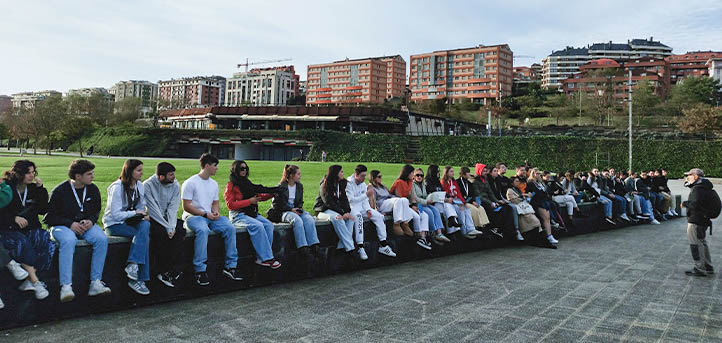A group of students in the third and fourth years of the degree program in Primary Education taught by the Universidad Europea del Atlántico (European University of the Atlantic, UNEATLANTICO) carried out a field trip to the Parque de Las Llamas in Santander. This is within the framework of the subject “Teaching and Learning Outdoor, Social, and Cultural Knowledge” taught by María Viota.
The activity has been carried out in collaboration with the Santander Capital Natural (Santander Natural Capital) project and was guided by the Sociedad Española de Ornitología (Spanish Ornithological Society), SEO/BirdLife. Santander Capital Natural is a project led by the Santander City Council that seeks to strengthen the role of urban green areas in the conservation of biodiversity at the local level, thus improving the quality of life of the citizens of Santander. The project also aims to use green areas to reconnect the urban population with nature and broaden social support for its conservation.
María Viota, professor at UNEATLANTICO and member of SEO/BirdLife, has seen the activity as “a real practice of a learning situation.” Likewise, as an opportunity for students to benefit from the educational dimension of the project, showing the importance of urban naturalization actions for the conservation of biodiversity and the improvement of our quality of life.
The activity has been designed with the objective of acquiring knowledge about biodiversity and didactic applications of urban ecosystems. In fact, the project is expected to run until December 2025, so there is a high probability that some of the students who attended the field trip will be able to replicate this activity in their future teaching roles, thus benefiting future students.
The field trip has been positively received, both from an individual point of view, considering the numerous benefits of exposure to green and blue spaces, as well as from an academic point of view.
In addition to being an innovative way to introduce the concept of biodiversity, and especially urban biodiversity, the project also has the potential to improve the physical and mental health of students by increasing the presence of nature in education.
The success of the outing was reflected in the evaluation questionnaire made by the teacher, where most of the students rated the experience with a 9 or 10. In addition, they have offered valuable suggestions for improving practice in future teaching programs, reflecting a critical spirit that Viota described as “reinforcing the power and value of this activity.”
More information about the project
The Santander Capital Natural project, which will last until December 2025, has the collaboration of the Santander City Council, SEO/BirdLife, the Asociación Amica (Amica Association), the Foundation for Climate Research, and the University of Cantabria. In addition, it receives support from the Fundación Biodiversidad (Biodiversity Foundation) of the Ministry for the Ecological Transition and the Demographic Challenge (MITECO) under the Recovery, Transformation and Resilience Plan (PRTR) and is funded by the European Union through NextGenerationEU.
Recently, the project has been recognized with the Sustainability Actions 23 awards, which reward initiatives and projects in the areas of environment, sustainability, and social inclusion.


